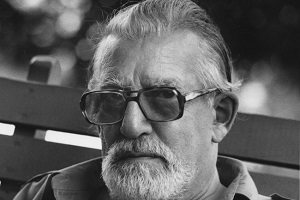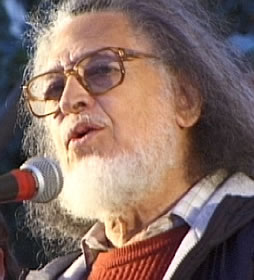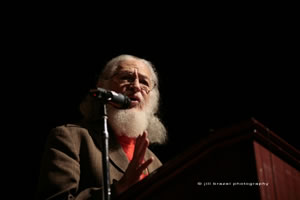De Vlaamse dichter en schrijver Erwin Mortier werd geboren in Nevele op 28 november 1965. Zie ook mijn blog van 28 november 2006 en ook mijn blog van 28 november 2007.\
Uit: Godenslaap
‘Een deur ging open, van de speelzaal die ik me vaag herinnerde uit vroeger jaren. Het rook er beslapen. De hoge ramen wierpen schuine balken van maanlicht op de vloeren, haalden uit de duisternis het plooienspel van dekens, een mouw, een hand, een hoofd tevoorschijn. Her en der lagen soldaten te slapen, alleen of tegen elkaar aan gekropen. Uit hun schoeisel, dat tegen de speeltafels aan lag waarop hun rugzakken rustten, steeg de lucht op van aarde, zomerse aarde, van tentzeil, geolied staan en gras op naar de zoldering met haar frivole stucwerk, dat sureëel boven de slapende gestalten hing.’
Aan de dichters
Hangen wij nog aan zijden draden
aan een wereld zonder graden vast
en flakkert de lamp van taal
in onze knuisten nog altijd zwakke magie?
Zijn wij nog immer spreeuwen
die het vlees van krieken klieven
en onverantwoord kleurrijk
de bril dichtschijten van het journaille en al
wat maliënkolders of mijters draagt?
Wegen wij nog altijd de wereld af
tegen plukken wol, één vrouwenhaar,
gevederte, en noemen wij,
onverbeterbaar, de wereld het lichtste?
Al zijn tijd en al zijn slachtingen ten spijt:
schateren wij in kieren? Laten wij scharnieren
janken? Vouwen wij vliegers,
puntige vliegers uit formulieren?
Erwin Mortier (Nevele, 28 november 1965)
De Franse schrijver Philippe Sollers werd geboren op 28 november 1936 in Bordeaux. In 1959 debuteerde hij met de ontwikkelingsroman Une curieuse solitude die enthousiast werd ontvangen. In de jaren tussen 1960 en 1982 experimenteerde hij zowel op politiek als op literair gebied. (Maoïsme). In 1983 lukte hem met Femmes een bestseller, waardoor hij weer terugkeerde naar het meer traditionele vertellen.
Uit: Une vie divine
„Ludi est une merveilleuse menteuse. C’est d’ailleurs la phrase que je me suis murmurée au bout de trois ou quatre rencontres : “merveilleuse menteuse”. Mère en veilleuse, très bo
nne menteuse. Il suffit de la voir, là, bien blonde épanouie aux yeux noirs, cheveux courts, avec sa robe noire moulante, sur la terrasse de cet hôtel, en été. Elle est fraîche, bronzée, elle sait qu’elle se montre, elle laisse venir les regards vers elle, elle s’en enveloppe comme d’une soie. Oui, je sais, elle vous dira qu’elle a pris deux kilos et que c’est dramatique, mais non, justement, elle est parfaite comme ça, rebondie, ferme, ses seins, son ventre, ses cuisses évoquent aussitôt de grands lits ouverts. Ah, ce croisement de jambes, ses fesses lorsqu’elle va au bar, sa façon de sortir et de rentrer et de ressortir et de rerentrer son pied de son soulier gauche – la cheville, là, en éclair -, et puis de rester cinq secondes sur sa jambe droite, et de recommencer, rentrer-sortir, rentrer-sortir, comme pour dire j’ai trouvé chaussure à mon pied, et c’est moi, rien que moi, venez vous y frotter si vous croyez le contraire. Son corps se suffit à lui-même et elle n’a pas à s’en rendre compte. Il dit tout ce qu’il y a à dire, mais elle ne pourrait pas le parler“.

Philippe Sollers (Bordeaux, 28 november 1936)
De Zuidafrikaanse dichter en (oud-)verzetsstijder Dennis Brutus werd geboren op 28 november 1924 in Harare in Zimbabwe. Hij studeerde Engels en pedagogie aan de universiteit van Witwatersrand. Van 1947 tot 1961 was hij leraar Engels en Afrikaans in Port Elizabeth. Vanwege zijn verzetswerk kreeg hij een publicatieverbod en mocht hij ook geen les meer geven. In 1963 werd hij veroordeeld tot 18 maanden dwangarbeid op Robben Island. In 1966 kon hij naar Engeland en later naar de VS emigteren, waar hij aan verschillende universiteiten doceerde.
On The Beach
Seablue sky and steelblue sea
surge in cubist turbulence,
dissolve, reform in fluid light
and cadences of sandsharp breeze;
spindrift from sand-dunes tresses down
to inlets where rock-fragments shoal,
seaspray and statice distil the mood
salt-sweet, foamwhite, seaweed-brown.
All in this jagged afternoon
where rock, light, sand and sea-air sing,
brown hair and air-live skin complete
this transitory plenitude.
Their Behavior
Their guilt
is not so very different from ours:
— who has not joyed in the arbitrary exercise of
power
or grasped for himself what might have been
another’s
and who has not used superior force in the
moment when he could,
(and who of us has not been tempted to these
things?) —
so, in their guilt,
the bare ferocity of teeth,
chest-thumping challenge and defiance,
the deafening clamor of their prayers
to a deity made in the image of their prejudice
which drowns the voice of conscience,
is mirrored our predicament
but on a social, massive, organized scale
which magnifies enormously
as the private dehabille of love
becomes obscene in orgies.
Dennis Brutus (Harare, 28 november 1924)
De Duitse schrijver Sherko Fatah werd geboren op 28 november 1964 in Oost-Berlijn. Zijn vader kwam uit het Iraakse Koerdistan, zijn moeder is Duitse. Zijn jeugd bracht hij door in de DDR, maar hij verbleef ook vaker in het land van zijn vader. In 1975 verhuisde hij naar Wenen, later naar West-Berlijn. Ftah studeerde filosofie en kunstgeschiedenis.Voor zijn roman „Im Grenzland“ ontving hij in 2001 de Aspekte-Literaturpreis. In 2002 kreeg hij de „Ehrenpreis zum Deutschen Kritikerpreis“.
Uit: Das Dunkle Schiff
Es war ein Sommertag, heiß, aber doch so windig, dass man es nicht wirklich spürte. Wolkenschatten eilten dunkel über die Ebenen und Hänge, als schwebten Luftschiffe durch den tiefblauen Himmel. Vielleicht war es der schönste Tag seines Lebens, nicht des leichten Lichtes und des sanften Windes wegen, nein, an diesem späten, saumselig vergehenden Tag verspürte er ein erstes Mal die tiefe Ruhe, welche die Schönheit gewährt, und erfuhr zugleich ihre Vergeblichkeit.
Um diese Jahreszeit zogen die alten Frauen hinaus, um Heilkräuter zu sammeln. Sie wussten, wann sie für welches Gewächs an einen bestimmten Ort zu gehen hatten. Weit mußten sie nicht hinaufsteigen, nur auf die Hügel. Dort sah er sie, eine kleine Kolonne, die wie so oft schon den nie ganz überwucherten Pfaden folgte. Sie sprachen und lachten laut, hier draußen waren sie endlich ganz unter sich, für ein paar Stunden fern von Räumen und Regeln. Hätten sie umhergeschaut, auch ihnen wäre die Unberührbarkeit der wilden Gräser, der Dolden und der warmen Steine aufgefallen. Doch sie schwenkten ihre Körbe, und ihre farbenfrohen Gewänder wehten im Wind, sie waren zu sehr miteinander beschäftigt. Fast beneidete er sie darum, so selbstvergessen hineingestellt zu sein in den Tag, der wie ein riesiges, geöffnetes Fenster um sie stand. Er lief ihnen nach, als sie hinter den Hügeln verschwanden, nur einfach um sie weiterhin zu sehen, winzig, doch nicht verloren, und blieb auf dem Hügel stehen. Er fühlte nicht mehr die Abgeschiedenheit hier draußen, nicht mehr die rauhe Einöde, er sah die Landscha
ft wie eine geöffnete Hand. Er atmete schwer. Ich bin noch ein Kind, dachte er kurz, meine Lungen sind nicht weit genug für diesen Tag. Und selbst wenn sie es wären, so ahnte er, dann könnte ich doch niemals weit genug in ihn hineingehen.

Sherko Fatah (Oost-Berlijn, 28 november 1964)
De Amerikaanse schrijfster Rita Mae Brown werd geboren in Hanover, Pennsylvania op 28 november 1944 als dochter van een ongehuwde tienermoeder die haar ter adoptie opgaf aan Ralph en Julia Brown. Rita Mae was leergierig en kon op haar derde al lezen. Op haar elfde verhuisde het gezin naar Fort Lauderdale, Florida, waar Rita Mae de middelbare school bezocht.Na het behalen van haar diploma ging ze in 1962 naar de Universiteit van Florida waar ze politiek actief werd en gedreven campagne voerde voor gelijke rechten en tegen maatschappelijke segregatie van Afro-Amerikanen. Haar sympathie voor figuren als Martin Luther King werd haar niet in dank afgenomen en haar beurs werd ingetrokken. Dit had tot gevolg dat ze de universiteit moest verlaten. Ze vertrok naar New York City waar ze enige jaren in armoede doorbracht, maar uiteindelijk ging studeren aan de New York University. Ze was actief in de beweging tegen de Vietnamoorlog en richtte in 1967 de Student Homophile League op. Dit was de eerste homoseksuele studentenvereniging in heel Amerika. Ze was bovendien als een van de weinige vrouwen betrokken bij de Stonewall-rellen op 27 juni 1969 in Greenwich Village in New York. In 1973 publiceert ze haar eerste roman, het semi-autobiografische Rubyfruit Jungle. Het boek werd een groot succes. Het werd een wereldwijde bestseller en een klassieker, waardoor ze een belangrijke rol binnen de homobeweging kon gaan spelen. Nu er was bewezen dat lesbische romans goed konden verkopen, ging Rita Mae zich volledig op het schrijven richten.
Uit: Rubyfruit Jungle
„No one remembers her beginnings. Mothers and aunts tell us about infancy and early childhood, hoping we won’t forget the past when they had total control over our lives and secretly praying that because of it, we’ll include them in our future.
I didn’t know anything about my own beginnings until I was seven years old, living in Coffee Hollow, a rural dot outside of York, Pennsylvania. A dirt road connected tarpapered houses filled with smear-faced kids and the air was always thick with the smell of coffee beans freshly ground in the small shop that gave the place its name. One of those smear-faced kids was Brockhurst Detwiler, Broccoli for short. It was through him that I learned I was a bastard. Broccoli didn’t know I was a bastard but he and I struck a bargain that cost me my ignorance.
One crisp September day Broccoli and I were on our way home from Violet Hill Elementary School.
“Hey, Molly, I gotta take a leak, wanna see me?.
“Sure, Broc.”
He stepped behind the bushes and pulled down his zipper with a flourish.
“Broccoli, what’s all that skin hanging around your dick?”
“My mom says I haven’t had it cut up yet.”
“Whaddaya mean, cut up?”
“She says that some people get this operation and the skin comes off and it has somethin’ to do with Jesus.”
“Well, I’m glad no one’s gonna cut up on me.”
“That’s what you think. My Aunt Louise got her tit cut off.”
“I ain’t got tits.”
“You will. You’ll get big floppy ones just like my mom. They hang down below her waist and wobble when she walks.”
“Notme, I ain’t gonna look like that.”
“Oh yes you are. All girls look like that.”
Rita Mae Brown (Hanover, 28 november 1944)
De Oostenrijkse schrijver Stefan Zweig werd op 28 november 1881 in Wenen. Zie ook mijn blog van 28 november 2006.
Uit: Verwirrung der Gefühle
„Ich weiß nicht, wie diese Geschichte zu mir kam. Ich bin nur, dessen entsinne ich mich, am frühen Nachmittage hier lang gesessen, habe in einem Buche gelesen und es dann sinken lassen, hindämmernd in Träumerei, vielleicht auch in leisen Schlaf Und plötzlich sah ich Gestalten hier, und sie glitten die Wand entlang, und ich konnte ihre Worte hören und in ihr Leben sehen.
Doch als ich den Entschwindenden nachblicken wollte, war ich schon wieder wach und allein. Zu meinen Füßen gesunken, lag das Buch. Nun ich es aufhob und nach den Gestalten frug, fand ich darin die Geschichte nicht mehr; es war, als sei sie aus den Blättern in meine Hände gefallen, oder sie war nie darin gewesen.
(…)
Wie soll ich beginnen? Ich fühle, ich muss einen Augenblick aus dem Dunkel herausheben, ein Bild und eine Gestalt, denn so beginnen auch in mir diese seltsamen Träume. Nun entsinne ich mich schon. Ich sehe einen schlanken Knaben, der die breitstufige Treppe eines Schlosses niedersteigt. Es ist Nacht und eine Nacht mit nur mattem Mondlicht, aber ich umfasse wie mit einem erhellten Spiegel jede Kontur seines geschmeidigen Körpers, sehe genau in seine Züge. Er ist außerordentlich schön. Kindhaft gekämmt fallen die schwarzen Haare glatt über die fast überhohe Stirne, und die Hände, die er im Dunkel verbreitet, um die Wärme der durchsonnten Luft tastend zu fühlen, sind sehr zart und edel. Sein Schritt zögert. Verträumt steigt er nieder zu dem großen, mit vielen runden Bäumen rauschenden Garten, durch den wie ein weißer Steg eine einzige breite Chaussee strahlt.

Stefan Zweig (28 november 1881 – 22 februari 1942)
De Russische schrijver en dichter Alexander Blok werd geboren op 28 november 1880 in St. Petersburg. Zie ook mijn blog van 28 november 2006.
De blauwe cape
Ik heb naar grootheid, naar succes, naar glorie
op deze bitt’re aarde niet getaald,
zolang mij jouw gelaat op tafel voor me
in ’t simpel lijstje maar heeft toegestraald.
’t Uur kwam, en jij ging heen, het huis ontstolen.
In nacht wierp ik de ring van goed en kwaad.
In and’rer hand heb jij je lot bevolen,
en ik vergat het wonderschoon gelaat.
De dagen vluchtten, één vloek na de ander…
Van drank en hartstocht is mijn leven moe…
En plotseling zag ik jou weer bij het altaar,
en, evenals mijn jeugd, riep ik je toe.
Ik riep je, maar je hebt niet omgekeken,
ik huilde, maar je bleef onaangedaan. T
Terneergedrukt sloeg jij je blauwe cape om,
in kille nacht ben jij uit huis gegaan.
Ik weet niet waar je voor je trotse wezen,
jij liefste, tederste, een rustpunt vond…
In droom zie ik de blauwe cape herrezen,
waarin jij in de kille nacht verzwond.
Het is te laat voor tederheid, voor glorie,
voorbij is alles, jeugd is heengegaan!
‘k Heb jouw gelaat, in ’t simpel lijstje voor me
van tafel eigenhandig weggedaan.
Vertaald door Frans-Joseph van Agt
Those born in obscure times
Those born in obscure times
Do not remember their way.
We, children of Russia’s frightful years
Cannot forget a thing.
Incinerating years!, do you bring tidings
of madness or of hope?
The days of war, the days of freedom
Have left a bloody sheen on our faces.
There is a muteness – the tocsin bell
Has made us close our lips.
In our hearts, once so ardent,
There is a fateful emptiness.
Let the croaking ravens
Take flight above our deathbed –
O Lord, O Lord, may those more worthy than us,
Behold Thy kingdom!
September 8, 1914
Alexander Blok (28 november 1880 – 7 augustus 1921)
Zie voor meer schrijvers die geboren werden op 28 november ook mijn vorige bericht.
















